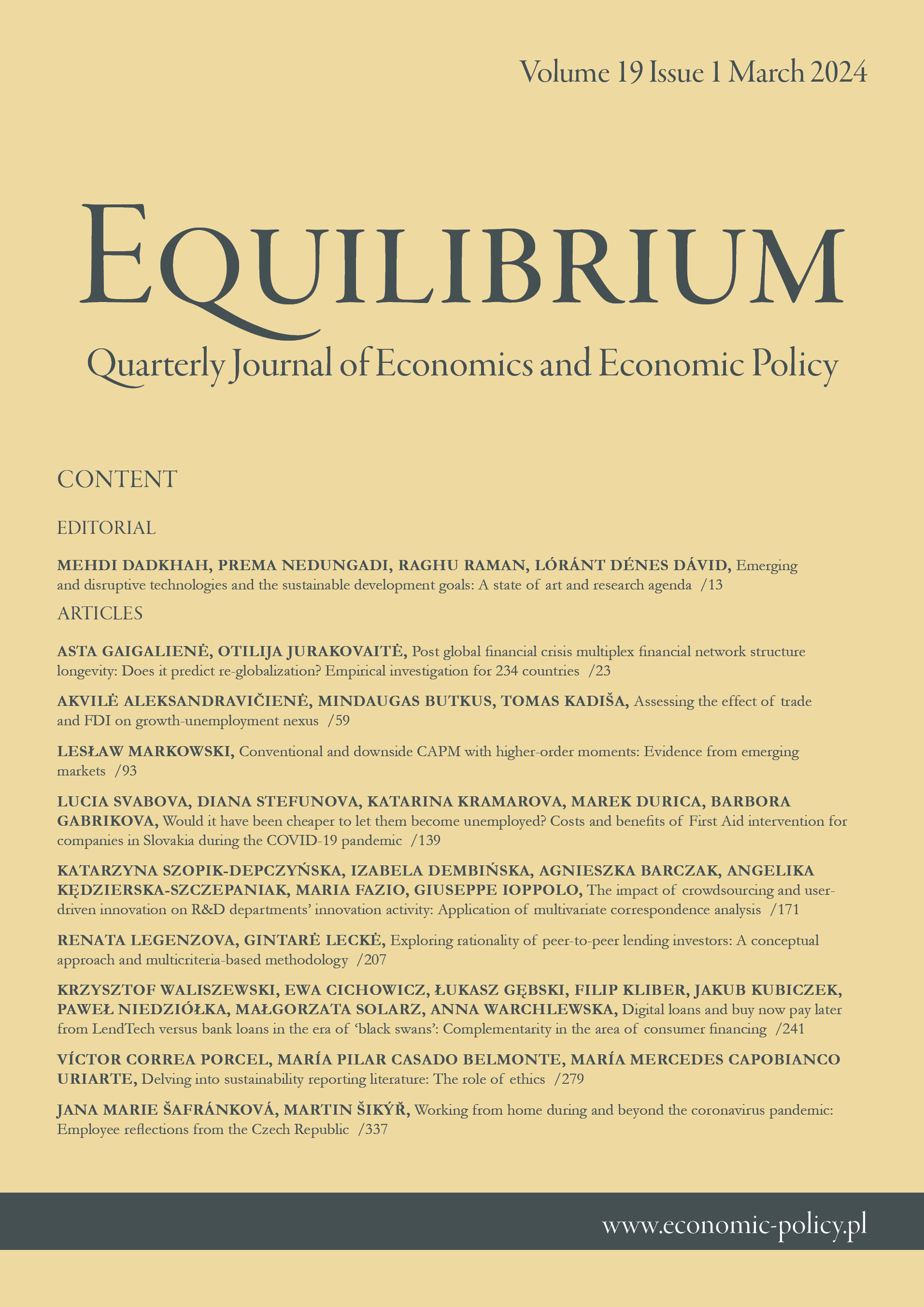INTANGIBLE INVESTMENTS AT MULTINATIONAL COMPANIES’ MANUFACTURING SUBSIDIARIES: DO THEY PROMOTE INNOVATION-BASED UPGRADING?
IF 6.2
Q1 ECONOMICS
Equilibrium-Quarterly Journal of Economics and Economic Policy
Pub Date : 2017-03-31
DOI:10.24136/EQ.V12I1.4
引用次数: 2
Abstract
Research background: Despite a widely acknowledged importance of intangible capital as the main driver of value creation, papers discussing corporate intangible investments tend to focus only on multinational companies, i.e. on headquarters (HQ). There are few papers scrutinising the specific attributes of intangible investments at manufacturing subsidiary level. This is, however, an important topic to investigate, since intangible investments can boost subsidiary upgrading. Intangible investments contribute to subsidiaries’ acquiring capabilities that allow them to enhance the scope of their responsibilities and specialise in increasingly high-value activities. Purpose: The purpose of this paper is to explore the features of intangible investment at MNCs’ manufacturing subsidiaries, on the example of Hungary. Research questions ad-dressed are as follows. a) What exactly do local manufacturing subsidiaries invest in, when they implement intangible investments? b) Is there a difference between the role of intangible investments at MNC level and at manufacturing subsidiary level? c) What is the association between subsidiary-level intangible investments and upgrading? Methodology: We analyse a sample of 44 manufacturing subsidiaries in the Hungarian automotive and electronics industries. We carry out a qualitative content analysis of sample companies’ notes to their financial statements, complemented with other sources of corporate information. Findings: We find that intangible investments are aligned with subsidiaries’ functional specialisation: with operations. Their main role is to contribute to subsidiaries’ absorption of the headquarters’ technology transfer and enhance the productivity of the local core activities. This is sharply different from their traditional, MNC-level role: support to non-price competitiveness. We find support for the argument that subsidiary-level intangible investments and subsidiary upgrading are associated in a self-reinforcing virtuous circle.跨国公司制造业子公司的无形投资:它们是否促进了基于创新的升级?
研究背景:尽管人们普遍认为无形资本是价值创造的主要驱动力,但讨论企业无形投资的论文往往只关注跨国公司,即总部。很少有论文仔细研究制造子公司层面无形投资的具体属性。然而,这是一个需要研究的重要话题,因为无形投资可以促进子公司的升级。无形投资有助于子公司的收购能力,使其能够扩大职责范围,专门从事价值越来越高的活动。目的:以匈牙利为例,探讨跨国公司制造业子公司无形投资的特点。研究问题如下。a) 当地制造业子公司在实施无形投资时,究竟投资了什么?b) 无形投资在跨国公司层面和制造子公司层面的作用有区别吗?c) 子公司层面的无形投资与升级之间有什么关联?方法:我们对匈牙利汽车和电子行业的44家子公司进行了抽样分析。我们对样本公司财务报表附注进行了定性内容分析,并补充了其他公司信息来源。研究结果:我们发现无形投资与子公司的职能专业化相一致:与运营相一致。他们的主要作用是帮助子公司吸收总部的技术转让,提高当地核心活动的生产力。这与他们传统的跨国公司层面的角色截然不同:支持非价格竞争力。我们支持子公司层面的无形投资和子公司升级是相辅相成的良性循环。
本文章由计算机程序翻译,如有差异,请以英文原文为准。
求助全文
约1分钟内获得全文
求助全文
来源期刊
CiteScore
9.20
自引率
3.50%
发文量
28
审稿时长
36 weeks
期刊介绍:
Equilibrium. Quarterly Journal of Economics and Economic Policy is a scientific journal dedicated to economics, which is the result of close cooperation between the Instytut Badań Gospodarczych/Institute of Economic Research (Poland) and Polish Economic Society and leading European universities. The journal constitutes a platform for exchange of views of the scientific community, as well as reflects the current status and trends of world science and economy.
The journal especially welcome empirical articles making use of quantitative methods in: Macroeconomics and Monetary Economics, International Economics, Financial Economics and Banking, Public Economics, Business Economics, Labor and Demographic Economics, Economic Development, and Technological Change, and Growth.
Current most preferable topics and special issues:
The economics of artificial intelligence: business potentials and risks;
Digitalization and entrepreneurship in economics;
Sustainable socio-economic development, environmental and ecological economics;
Transition in the energy market (improving energy efficiency, alternative energy sources, renewable energy, energy security).

 求助内容:
求助内容: 应助结果提醒方式:
应助结果提醒方式:


